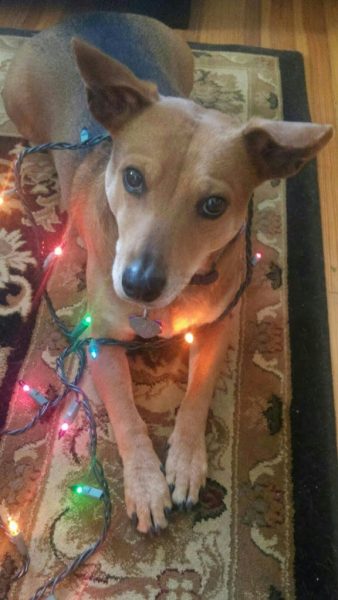 The holidays can mean confusion — or new temptations — for your pets. Some holiday foods and decorations can be hazardous to your pet. Other circumstances, like traveling or parties/guests, can stress out our animal friends. Colorado State University’s Veterinary Teaching Hospital has published some excellent tips for keeping your pets safe and stress-free during the holidays:
The holidays can mean confusion — or new temptations — for your pets. Some holiday foods and decorations can be hazardous to your pet. Other circumstances, like traveling or parties/guests, can stress out our animal friends. Colorado State University’s Veterinary Teaching Hospital has published some excellent tips for keeping your pets safe and stress-free during the holidays:
Enjoy The Holidays While Keeping Your Pet Safe. Many traditional holiday foods contain ingredients that are toxic to pets, and this article offers a list of foods to keep away from your pets, as well as decorations that could be hazardous — including poisonous plants (holly, ivy, and mistletoe), Christmas tree water that contains hazardous chemicals or preservative agents, or even small ornaments and tinsel which are attractive to pets, especially cats, but can be hazardous if ingested. Also in this article you will find tips on how to tell if your pet is under stress.
Watch for Pet Poisons Around Your Home. This article also discusses poisonous foods and plants, and how you can respond if your pet does eat something he shouldn’t.
Help Pets Avoid Hazards During the Holiday Season. Like the above articles, this one also discusses poisonous plants and foods, but it also contains tips for keeping pets safe when you have houseguests.
Veterinarians Offer Seasonal Tips to Ease Travel With Pets and Prevent ‘Pupsicles.’ This article is twofold: first, it offers helpful tips for traveling with pets, including what kinds of carriers to use and what items to pack. Secondly, the article discusses ways to keep pets warm and safe in frigid winter weather (just in time for today’s freezing temperatures!)
To Blanket or Not to Blanket? This article for horse owners discusses whether, and how best to, blanket your horse on cold, snowy days like today.
Finally, there’s the old debate over whether poinsettias are poisonous to pets. A fact sheet from the CSU Extension tells us that “poinsettia plants are not harmful to household pets unless the leaves and bracts are eaten in very large quantities. Since cats and puppies frequently chew on new plants introduced in the home, it is prudent to place the plants out of reach.”
- How to Spot the Differences Between Eagles and Hawks - August 16, 2021
- How Transportation Projects Help Tell the Story of Colorado’s Past - August 9, 2021
- Time Machine Tuesday: The Night the Castlewood Canyon Dam Gave Way - August 3, 2021
